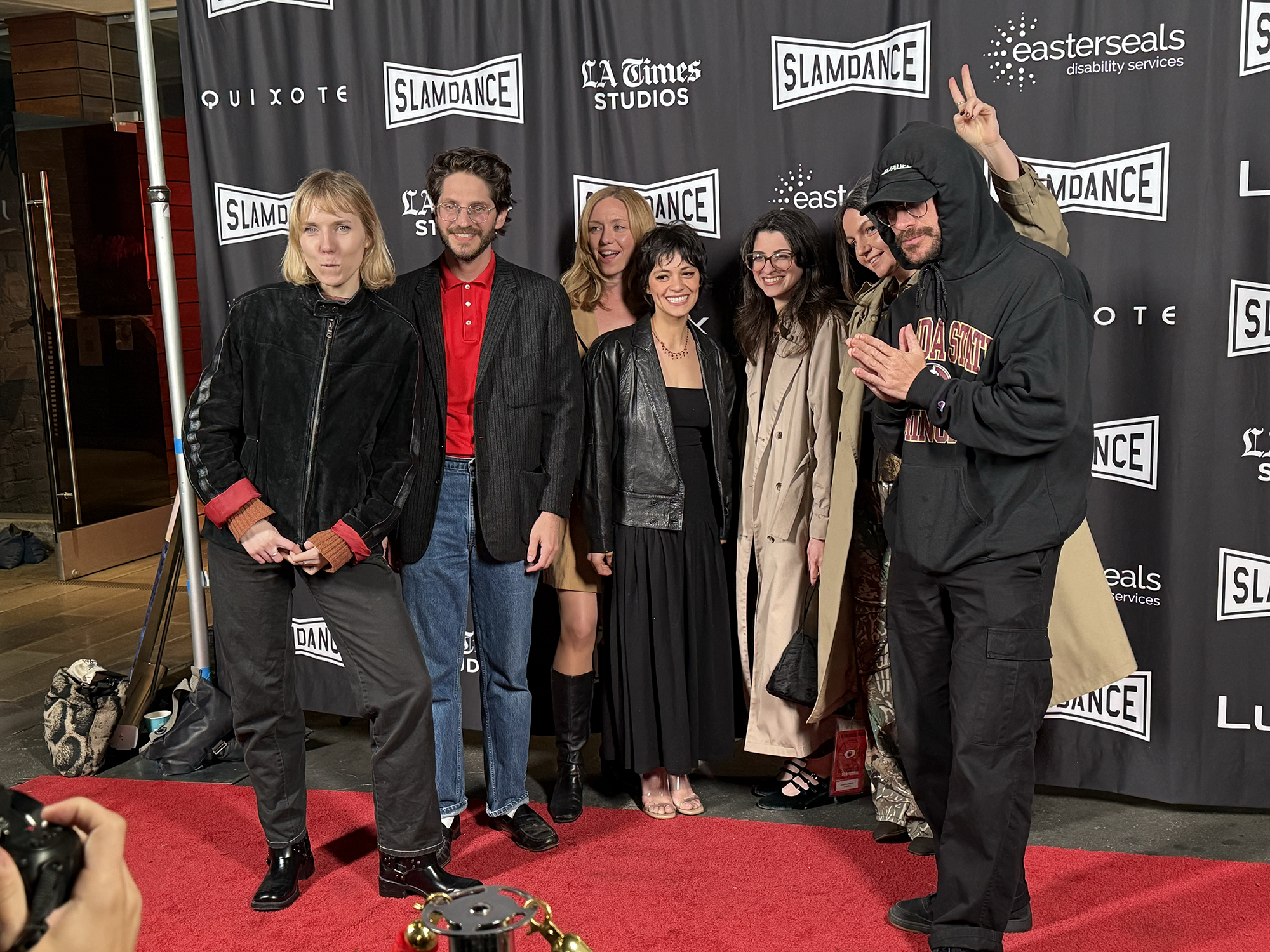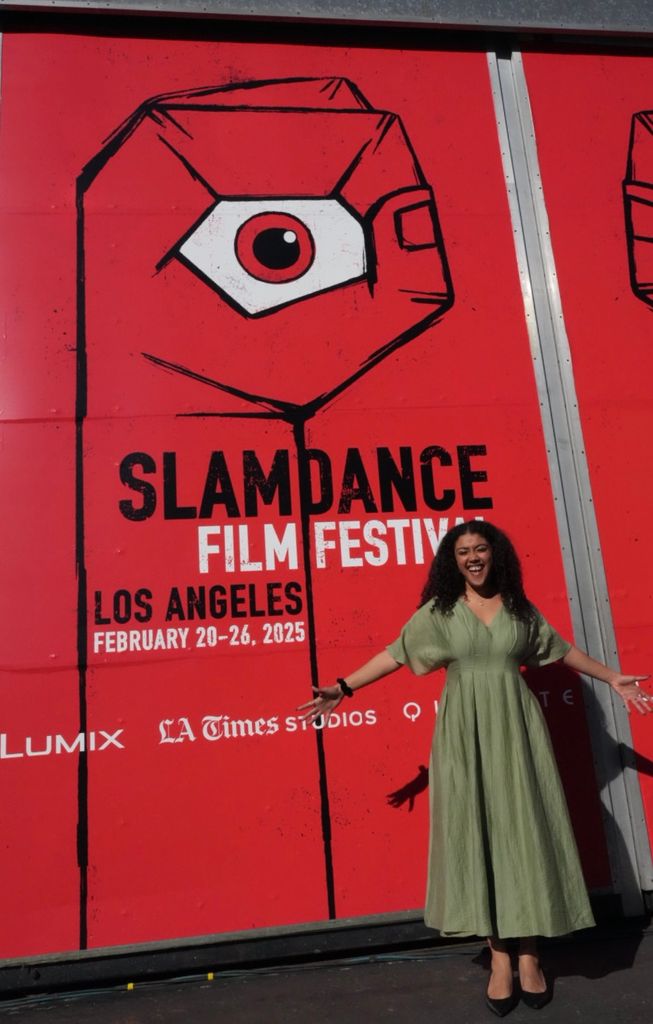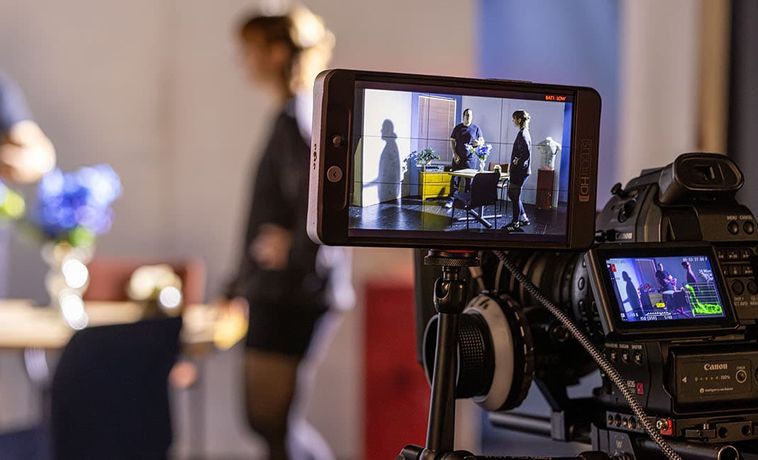
Sabrina Greco (third from right) with the cast of Lockjaw, at the 2025 Slamdance Film Festival. Photo courtesy of Sabrina Greco
Alums Break Through at Slamdance Film Festival
For young filmmakers, festivals are a critical way to get their movies seen
Jessica Senquiz’s 2025 Slamdance Film Festival was so pivotal in her life—from walking the red carpet to watching the world premiere of her film, Promise to Stronger Days—that she decided to commemorate the experience “and me as a filmmaker” by getting a small camera tattooed on her wrist.
Senquiz (’22) began writing Promise to Stronger Days (PTSD)—a narrative short based on her experience with childhood sexual assault and PTSD—as a sophomore at COM. Selection by Slamdance, a prestigious festival known for highlighting new voices, was validation of her skill as a filmmaker and the resonance of her film.
Sabrina Greco used personal savings and credit to fund her feature film Lockjaw; being selected to premiere it at Slamdance 2025 justified that gamble. “It was assuring to know that this movie is going to have a life,” says Greco (’19).
For young, independent filmmakers like Senquiz and Greco, participation in an event like Slamdance can be a career-altering opportunity.
“For filmmakers who operate outside of the mainstream, whose work may push boundaries or have something fresh to say, festivals have become the only place to showcase their work in front of an audience,” says Amy Geller, an assistant professor of film and television at COM.
Fortunately, there are thousands of festivals around the world, from COM’s Redstone Film Festival to the glitz and glam of the Cannes Film Festival. Slamdance falls somewhere in between. The festival was established 30 years ago in Telluride, Colo., by a group of filmmakers—including Paul Rachman (Pardee’82)—who had been rejected by the Sundance Film Festival. Slamdance has since grown into a preeminent venue for first-time directors, small-budget projects, and filmmakers with disabilities. In 2025, the festival moved from Colorado to Los Angeles.
Finding an Audience
Senquiz knew she wanted to make a film about her own traumatic childhood experiences. She was confident there was an audience—she just needed to find it. “Sexual assault is as common as rain,” she says. “I knew there was an audience just because of the nature of sexual violence in America.”
PTSD tells the story of one night in the life of a young woman, interspersing an intimate encounter she has with the childhood memories it triggers. The 20-minute film takes readers on an emotional roller coaster that Senquiz hopes survivors will identify with and others can learn from.
Not everyone agrees that there’s an audience for such challenging material. She recalls sharing her script with someone at BU. “Nobody wants to read this,” she recalls him saying. “You should make an action film.” Senquiz was undeterred. “I knew he was wrong. I think in reality there’s a huge audience that’s untapped.”
Eager to have a business plan for her film, Senquiz signed up for a course that Geller teaches about crowdfunding and distribution. She connected with survivors on social media, asking for ideas and advice to consider as she wrote and produced the film. For one class project, she raised $10,000 with a GoFundMe campaign. And she began studying the festival calendar.
For filmmakers who operate outside of the mainstream… festivals have become the only place to showcase their work in front of an audience.
Amy Geller
“She was incredible at planning her festival strategy,” says Geller. “She was coming up with a festival wish list and putting them in priority order even before she had completed the film.” Slamdance was at the top of that list. Its Unstoppable category—which PTSD was selected for—features films made by people with a disability. A 2024 Unstoppable selection, Makayla’s Voice: A Letter to the World, is now streaming on Netflix.

“I’ve never been in a theater watching people watch work that I’ve had a part in,” Senquiz says. “It was really cool to see how people were actually feeling about the film. They were holding their hands on their chest. There were some tears. There were some deep sighs. There was laughter.” Even more gratifying were the interactions that followed. Survivors shared their own experiences with Senquiz and praised the film, saying things like, “This film makes me feel so normal.”
The PTSD crew was filled with COM alums, including producer Katarina Soto (’22) and production designer Olivia Malek (’22). They made the most of the Slamdance experience, attending panel discussions and networking lunches. “You can go to one event and it can change the trajectory of your film,” Soto says.
At the festival, another Slamdance director asked if PTSD could be screened before her film’s New York City premiere.
“There’s so much that’s going to come out of this,” says Senquiz. “It was an amazing opportunity, and I feel like it’s just going to continue to pay off.”
Getting Distribution
Sabrina Greco began writing Lockjaw in 2022. The comedy is about a young woman looking to enjoy a night out even though her jaw is wired shut as she recovers from a drunk driving accident. “My goal, initially, was just to make something that I felt good about and could show people,” she says. Quickly, she realized it could be something more.
She targeted Slamdance because the narrative feature category focuses on first-time directors who have made films for less than $1 million. “And Slamdance movies have a history of getting distribution,” Greco says. “That’s a big goal for the movie at this point.”
The success of Lockjaw—and PTSD—means a boost for more than just the director. Greco made her film with a COM-filled crew, including her fiance, the movie’s cinematographer and editor Neal Wynne (’19). “A lot of us moved to LA together with the intention of doing stuff like this,” Greco says. “COM provided a really good environment for us to find groups of people who we like working with.”
Like Senquiz, Greco hadn’t screened her film before an audience until she arrived at Slamdance and she was anxious to find out how viewers would respond. “It was nice to hear their initial reactions to it—it was like, ‘OK, I can now say that the movie works,’” she says. “It’s so nice, after going through this long process of making a feature, that it’s resonating with people.”
As Lockjaw has gained momentum, Greco has attracted investors. That’s helped her cover new expenses such as legal fees and public relations. “There are a lot of expenses that I wasn’t totally aware of,” she says. “But it’s a very good problem to have because it means the movie is doing well.”
She’s continued to enter festivals—the next Lockjaw screening will come at the Atlanta Film Festival in late April—and a sales team is working on selling the international distribution rights.
Senquiz reflects on the impact of Slamdance. On the evening after the second screening of PTSD, she rushed from the tattoo parlor to a karaoke bar where a crowd of Slamdance participants had gathered to celebrate. Almost immediately, she and Soto were called onstage for a duet. “Everyone was screaming—it felt like a movie,” Senquiz says. The two launched into Natasha Bedingfield’s catchy early-2000s hit “Unwritten.” The song provided an apt ending to their week: “I’m just beginning, The pen’s in my hand… Today is where your book begins, The rest is still unwritten.”
The first thing Senquiz did when she got home from the festival was to start writing her next film. Greco is doing the same.
COM CREWS
Both Senquiz and Greco relied on connections made at COM to produce their films. Here are the BU alums who helped to make their films a reality.
Promise to Stronger Days
- Jessica Senquiz (’22): writer and director
- Katarina Soto (’22): producer
- Olivia Malek (’22): production designer
- Rafeeat Bishi (’24): social impact producer
- Kelly Peña (CGS’20, COM’22, MET’25): producer
Lockjaw
- Sabrina Grecco (’19): writer, director and coeditor
- Neal Wynne (’19): cinematographer and coeditor
- Nicolas Tepper (’19, CAS’19): gaffer and camera operator
- Jake Squire (CGS’18, COM’20): associate producer and grip


